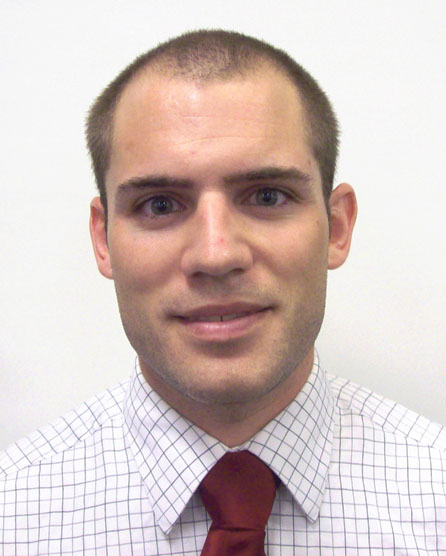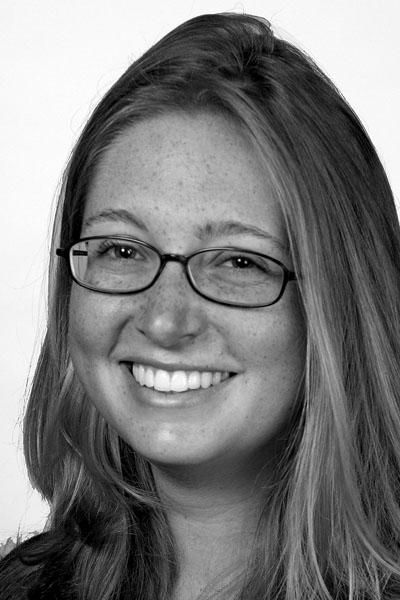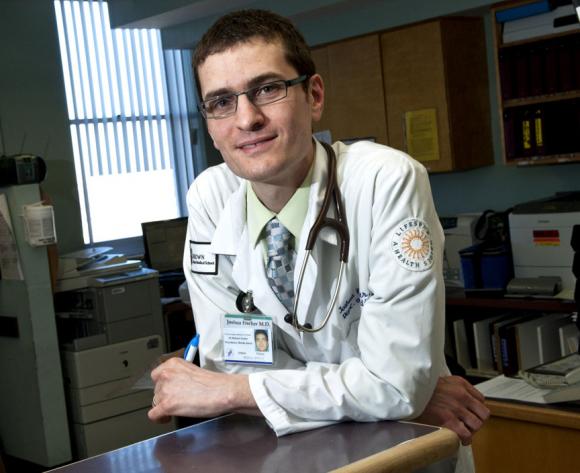PROVIDENCE, R.I. [Brown University] — Statistics show a worrying downturn in the supply of new primary care doctors across the nation, but the way to reverse that trend has little to do with aggregations and averages. A young doctor’s decision whether to pursue a career in primary care or to specialize is deeply personal, even if it is also a major public policy concern.
A new partnership among Brown’s Alpert Medical School, the Rhode Island Foundation, and Lifespan Corp. to promote primary care is therefore launching with a focus on mentoring. To address the primary care pipeline problem is to compete one-by-one for students’ hearts and minds.
Take the case of Dr. Joshua Fischer. Throughout his education at Alpert Medical School and now in his internal medicine residency at Rhode Island Hospital, he has thought a lot about how he can best make a difference as a doctor.
On rounds in the hospital, he sees ailing patients confined to beds by uphill fights against diseases that perhaps could have been prevented by healthier choices. In a primary care clerkship as a student in 2009, he saw doctors and patients discuss those choices and come up with plans for nipping emerging health problems in the bud.
“The place where you really make a difference in caring for adults is not usually in the hospital once people have reached the dramatic end-stage of illness, but it’s in the ‘mundane’ things that happen in the primary care office,” he said. “I’ve had the thought with some of my patients that what I’m doing now might not help very much, but if I could rewind 20 years and be the primary care doctor sitting across the table from this person and convince them to take better control of their diabetes, then they wouldn’t be here now with end-stage kidney disease and on dialysis.”
He traces that sense, and the resulting lean toward a career choice in primary care, to the mentoring and professional exposure that he gained from preceptors in private practice.
“I just had a very good experience there. I really enjoyed the doctors I worked with,” Fischer said. “I really enjoyed the variety of things they saw and the relationships they had with their patients over a long period of time. That got me very interested in it.”
A mentoring (and money) matter
The most frequently cited reason why medical students don’t pursue primary care is financial, said Dr. Edward Wing, dean of medicine and biological sciences. Primary care doctors are paid much less than many kinds of specialists, yet they often must deal with heaps of insurance and medical records bureaucracy.
“Primary care doctors really work hard and they have very difficult conditions,” said Wing. “Medical students have tended to go into the higher earning fields where they can make three to five times what primary care doctors make.”
Fischer knows all that, but he notes he can still expect to make more than $100,000 as a starting primary care physician, which is a better salary than more than 90 percent of his fellow Americans. He figures he might not be as rich as fast as friends who specialize, but he’ll be all right.
Brown students and residents say it’s more complex than money. Like Fischer, they leave a lot of room for inspiration.
That’s why with a grant of $87,500, the Rhode Island Foundation, the Alpert Medical School and Lifespan feel they can begin to have an impact, said Owen Heleen, vice president for grant programs at the Rhode Island Foundation.
“I don’t think it’s all about the money,” said Dr. Kathleen Hittner, Lifespan’s senior vice president for community health and perioperative services, who helped unite the three institutions behind the idea. “I think it’s about lifestyle and feeling gratified in the work you do. If the students don’t see how rewarding it is to practice in that office setting, how are they going to want to go into primary care?”
Nationally, the proportion of medical school graduates expressing an interest in primary care in surveys by the American Association of Medical Colleges has dropped from one in three in 1983 to about one in six in 2009.
That trend concerns the foundation, said Heleen, especially at a time when increased access to health insurance will enable more than 100,000 Rhode Islanders to seek regular medical care. The foundation has elevated improving the supply of primary care physicians in Rhode Island to the level of a Signature Initiative. Reforming public education is the only other concern on that level.
“Primary care really resonates with people in a very personal way,” Heleen said. “Everybody needs a strong primary care connection.”
Wing said the grant will be important for the state, where both he and Hittner note that primary care physicians are paid even less than in neighboring states.
“This is an important building block and a big step in Rhode Island, supporting medical education oriented toward primary care,” Wing said. “That is a big deal. One of the most influential aspects of career choice for students is a strong role model during medical school.”
The money will help the school shore up mentoring programs, such as clerkships, by providing primary care doctors in the community with financial compensation for sharing their time with students. In the current health care system, primary care doctors are constantly under pressure to see as many patients as possible. Time spent as a preceptor, instead of with a patient, is lost revenue.
The problem has often forced the school to find new preceptors as it has strived to continue offering inspiring clerkships for students, said Dr. Mark Fagan, a Rhode Island Hospital physician who runs the school’s internal medicine clerkship program. The clerkship includes four weeks of contact with primary care preceptors.
“We’ve had practices that we’ve worked with for a long time that have had to drop out,” Fagan said. “We have had to scramble to find sites.”
The grant money will not only temper those worries for community doctors, Fagan said, but will do something more lasting. It will provide doctors with a concrete sense that the school respects their time and their tutelage.
“This doesn’t really compensate them fully for their time, but it’s a gesture of good will and good will goes a long way,” Fagan said. “It’s a way of providing them with the sense that their contribution to medical education is valued and recognized.”
Inspired choices
That speaks to the idea that money, while clearly important, is only part of the mix both for preceptors and their students.

Fourth-year medical student Andrew Van Wieren is a good case study. He came to Brown as an undergraduate in the Program in Liberal Medical Education with strong primary care role models already in mind: his parents. For a long time, his doctor father and nurse practitioner mother were essentially the only medical staff in rural Grant, Mich. The National Health Service Corps, a federal program that sends participating doctors to areas of high need, placed them there. They only had to stay for a few years, but they have been there for decades.
“They have patients he’s been taking care of since he moved there 30 years ago,” Van Wieren said.
Dedicated to serving the underserved, but also eager to get through school without the typical hundreds of thousands of dollars in loans, Van Wieren also applied for and won an NHSC scholarship. In exchange for the federal government paying his tuition and a stipend, Van Wieren will spend at least the first four years of his career practicing primary care in a “high-need Health Professional Shortage Area.”
Now locked into primary care, wouldn’t Van Wieren find less inspiration in good mentoring? Not at all. Both in working with Dr. Michael Maher at the Rhode Island Free Clinic and in the resident clinic at Rhode Island Hospital, he’s found reassurance that he has indeed made a fulfilling decision.
“The entire department of general internal medicine at Rhode Island Hospital is just amazing, full of people who are great teachers and really care about students,” he said. “They encouraged me. They’ve been great mentors.”
But in other cases, even students inclined toward primary care, who value the mentoring they received, will still find other callings. And it won’t always be for the money. Specialties that pay better are not necessarily less fulfilling.
“Many students choose specialties because they really like them,” Wing said.

Dr. Juan Vasquez, a recent Alpert Medical School alumnus now in a pediatrics residency at Hasbro Children’s Hopsital, is passionate about serving underserved children, and for years he imagined doing so as a community doctor. But his most compelling medical school experience took him in another direction when he spent time in a hematological oncology lab. Primary care doesn’t allow much time for that kind of research, so Vasquez plans to pursue a pediatric oncology specialty after he completes his primary care residency.
And student Lily Pike says she’s very much on the fence between family medicine with an obstetrics focus and an obstetrics/gynecology specialty such as maternal fetal medicine. She grew up on Block Island, where family doctors seemingly do it all — from delivering babies to geriatrics to managing summertime trauma cases — and she takes her inspiration from them. She’s also found the primary care physicians she’s met while in school to be great physicians and spokespeople for the career. But she says she also wants to manage high-risk pregnancies and surgical obstetric complications, and that may require specializing.
Ultimately what Alpert Medical School, the Rhode Island Foundation and Lifespan will do is make sure that primary care has a fighting chance in the minds of students and residents. It will still be their decision.
Dr. Philip Gruppuso, associate dean for medical education and the primary architect for the medical education portion of the grant, says the school is in it for the long haul.
“This will be a sustainable effort,” Gruppuso said. “This goes beyond one grant. This is the beginning of something we are absolutely committed to.”

